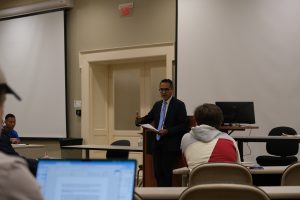
Roosevelt Montás, senior lecturer and the director of the freedom and citizenship program at Columbia University, describes his novel as “three books in one:” a memoir, an introduction to the most influential authors in his life, and a guidebook on how to critique thinking and liberal education in this day and age. Montás held a lecture regarding his 2021 novel, “Rescuing Socrates: How The Great Books Changed My Life and Why They Matter,” last Wednesday, Sept. 20 in Bryant Hall.
Montás was born and raised in the Dominican Republic before he immigrated to New York as a teenager. In his formative years, authors such as Plato, Augustine, Freud and Ghandi greatly impacted Montás’ life and influenced his way of thinking.
“There is a considerable distance between where I grew up and this podium,” Montás said.
While Montás shared his historical influences, namely Frederick Douglas, he spent most of his lecture stressing the advantages of liberal education for young minds.
“Liberal education is about self-governance,” Montás said. “If you care about freedom, you care about liberal education.”
He stressed that the concept of liberal education does not solely refer to liberalism in the political sense; rather it promotes free thinking and individuality beyond the political spectrum.
“Liberal education soaks you and rearranges everything you know,” Montás said. “Not ‘new knowledge,’ but a new understanding.
Although Montás emphasized individuality as a fundamental concept, he did not hesitate to warn of the complexities brought about by individual freedom.
“Freedom is great, but it’s got its own problems,” Montás said.
He went on to explain how our wants often conflict with what is required to achieve those wants.
“We want to be fit, but we don’t want to work out,” Montás said. “Desires are sincere, but not compatible.”
Montás did not discredit general education, but he does stress the significance of a greater understanding of humanity that general education, in most cases, cannot provide.
The liberal arts, as he describes, are perhaps the best way to allow for such an understanding. He goes on to say that in the wake of our current world and overall democratic crisis, “our grounding in the liberal arts will be our most valuable resource.” However, he understands that it is up to universities’ faculty and administrations to plant those seeds and cultivate a more meaningful way of learning.
“Our students need an understanding of the human questions,” Montás said. “Liberal education is meant to help you find your way.”



























